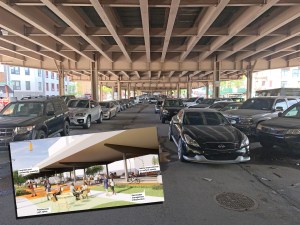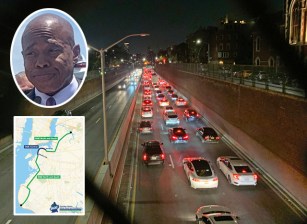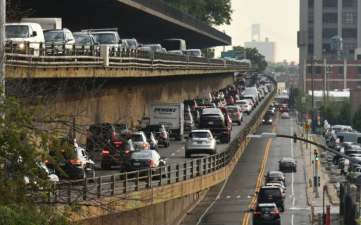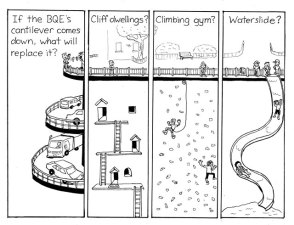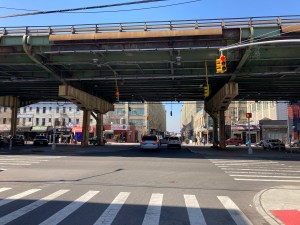City May Restore BQE to Six Full Lanes of Nastiness, Sources Say
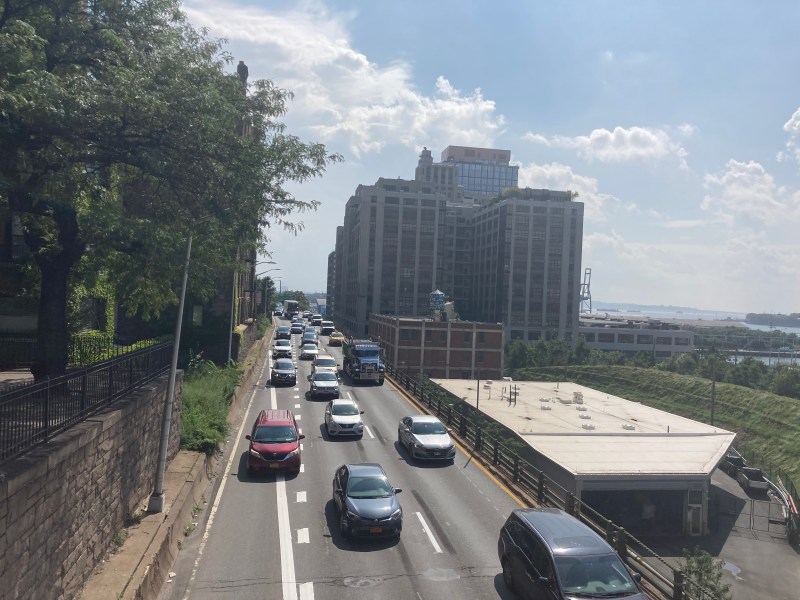

The future of the BQE may be going backwards.
The city is considering re-widening the beleaguered triple-cantilever section of the Brooklyn-Queens Expressway back to six lanes of traffic because the existing narrowing of the roadway has sent too much congestion onto local side streets, according to sources who have been briefed on the plan.
Last summer, under the former de Blasio administration, the city nixed one lane in each direction along half a mile of the crumbling structure between Atlantic Avenue and Sands Street to prevent its collapse as officials worked on a long-term solution — a total reimagination of the Robert Moses-era highway between Queens and the Verrazzano Narrows Bridge.
But according to sources familiar with behind-the-scenes conversations, the Department of Transportation is looking to bring back those lanes to unplug what it calls a bottleneck that has created backups on residential streets north and south of the three-tiered section, and to accommodate the nearly 153,000 vehicles a day that traverse the roadway.
“That means they’re talking about a highway widening project, which in this day and age, is insane,” said one person with knowledge of the discussions.
And according to the Brooklyn Heights Association — which initially supported a plan to maintain the highway as is in order to save the historic Brooklyn Heights Promenade at risk of closure now wants to help break the city’s car culture, starting with the six-lane highway that cuts through their own neighborhood — the DOT is not only eyeing a rebuild as is, but also a possible expansion of the highway in order to make room for six lanes of traffic plus a shoulder.
“Rebuilding and potentially even widening the BQE to accommodate six lanes of traffic is most definitely on the table,” the BHA wrote in its Dec. 10 newsletter. “If true, we believe that it would be a fundamental step backwards and will not address air and noise quality, climate concerns, and the community’s stated desire to shrink — not expand — the highway.”
The saga of the BQE dates back to 2018, when the DOT said the 0.4-mile triple cantilevered-stretch under tony Brooklyn Heights would collapse by 2026 under the weight of the thousands of trucks it carries daily if it was not fixed. The DOT at first proposed just rebuilding the six-lane highway as is, but neither that nor other designs from private urban planning and architecture groups stuck.
Eventually, ex-Mayor Bill de Blasio tapped his own so-called expert panel to come up with a new design. And a few months before leaving office, de Blasio agreed with the group’s recommendation to reduce the roadway on the cantilever section from three lanes to two in each direction to alleviate the stress of heavy vehicles, but he punted the full reimagination of the entire stretch to his successor, Mayor Adams.
This past September, Adams announced he was kicking off the community engagement process for all of the neighborhoods affected by the BQE. But before the long-delayed rebuild can begin, the city must do prep work that’s set to start this March, which means closing sections of the BQE in each direction during an undisclosed number of nights and three weekends between March and October, sending rerouted traffic onto Third and Fourth avenues and other local roads. Locals fear it will mean even more deadly thoroughfares and a full-fledged carmageddon.
Ahead of a pair of workshops on Tuesday and Thursday, the DOT gave a sneak peak of its current thinking to members of a BQE advisory group last week. Amy Breedlove, of the Cobble Hill Association and who was at that meeting, said she’s worried about a possible expansion. The answer is less, not more.
“From a Cobble Hill perspective, three lanes on the cantilever is not going to alleviate the traffic that we have,” said Breedlove, pointing to the clogged trench section of the BQE that cuts through her brownstone nabe.
“What we wanted was for it to stay two lanes with a shoulder, because the whole thing is to take the opportunity … to cut down usage of personal vehicles,” she added.
Breedlove said DOT kept emphasizing during the virtual workshop last week with the BQE’s so-called Community Visioning Council that they don’t yet have a “baked plan.” But she’s not so sure.
Slides from the closed-door session obtained by Streetsblog show several diagrams of the triple-cantilever stretch with three lanes in each direction instead of the current two. The presentation lists as one of the “considerations” the city is exploring “roadway width and configuration,” with a graphic of three lanes.

Officials told the Visioning Council that they plan to apply for federal funding for the BQE work in the spring — and to comply with federal safety standards, the city would need to build out a wider space for the new shoulder.
When de Blasio cut the two cantilever lanes last year, DOT was actually able to repurpose the space for emergency shoulders and widen the remaining two lanes from a tight 10.6 feet to 12 feet each, bringing the old highway up to code.

The DOT declined to comment, and spokesperson Vin Barone said officials will have more to share at the public meeting.
BQE Central Workshop 2 (in-person) on Tuesday, Dec. 13 at 6:30 p.m. at the New York City College of Technology, 285 Jay St., Brooklyn. There will be a follow-up virtual session on Thursday, Dec. 15 at 6:30 p.m. Click here to register in advance.
